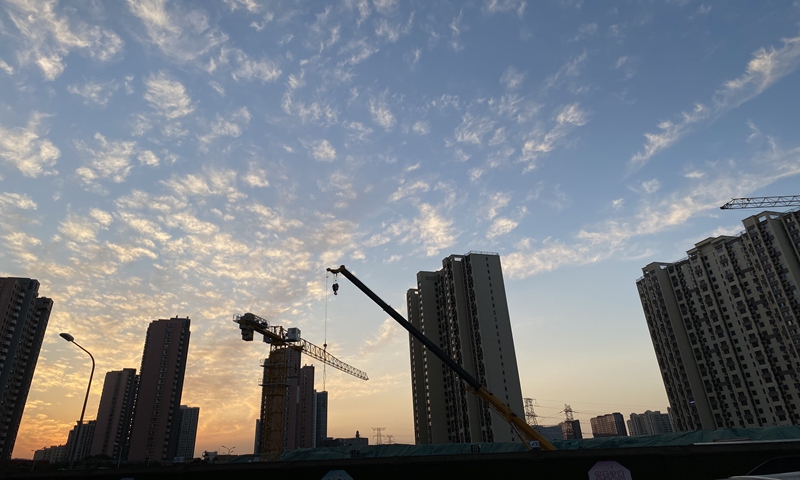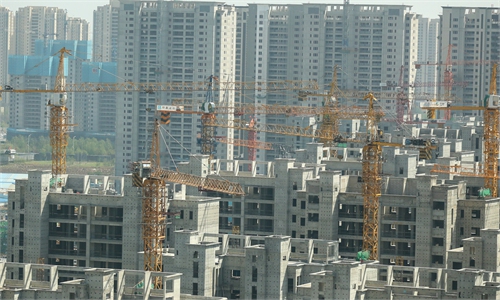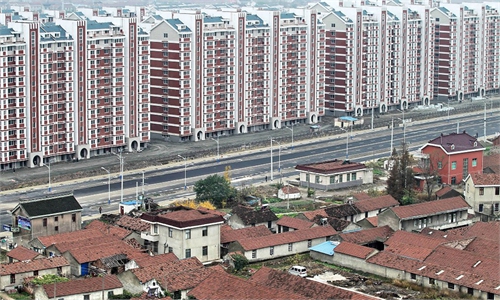Some Chinese localities encourage group home buying to prop up sluggish property market

Cranes are seen at a construction site of a housing complex in Beijing. Photo: VCG
A number of Chinese localities have announced a range of measures to encourage home buying in a bid to prop up the sluggish real estate sector, which experts have stated will be useful for reducing inventory in some regions, but greater efforts needed to spur demand for overall macro-economic recovery.
At least 10 cities have announced policies for home group buying, including Changchun in Northeast China’s Jilin Province, Taiyuan in North China’s Shanxi Province and Lianyungang in East China’s Jiangsu Province, according to media reports.
The latest is Meizhou, in Southwest China’s Sichuan Province. The city recently released a draft document for public comment on encouraging home group buying for enterprises and social organizations outside the city to buy apartments in the city, with discounts of up to five percent available, domestic news site thepaper.com reported on Wednesday.
The document has since been removed from the local government website. A local government agency told the Global Times on Thursday that the activity has been delayed, and local authorities are studying the feasibility.
“As a large-scale marketing activity organized by governments, home group buying activity is a sound measure to reduce inventory and boost transactions,” said Yan Yuejin, research director at Shanghai-based E-house China R&D Institute.
In the meantime, dozens of cities across the country announced policies to support home purchases by families with two or three children, including relaxing purchase restrictions, increasing loan amounts of housing provident funds and providing subsidies for home purchases.
A variety of measures released by local governments has served to underscore the downward pressure faced by the country’s property market, according to experts.
From January to July, total new residential floor space completed reached 232.79 million square meters, down 22.7 percent year-on-year. National real estate development investment fell 6.4 percent year-on-year in the first seven months, according to data from the National Bureau of Statistics.
In contrast, China’s household deposits rose by 10.3 trillion yuan ($1.5 trillion) in the first half of the year, a record and exceeding the 9.9 trillion-yuan increase registered for the whole of 2021, according to data from the People’s Bank of China.
“Targeted measures to encourage consumers buy apartments might not yield the desired effect, as the problem is declining willingness to spend on real estate,” Song Ding, a research fellow at the Shenzhen-based China Development Institute, told the Global Times on Thursday. He said the key of stimulating domestic real estate market lies in restoring consumer confidence.
A State Council meeting on July 22 stressed that city-specific policies will be adopted to promote steady and sound development of the real estate sector. People’s basic housing needs will be met and their wish to improve housing conditions will be supported as appropriate.
As an encouraging sign to bolster market confidence, the central bank on Monday cut the five-year loan prime rate by 15 basis points (bps) from 4.45 percent to 4.3 percent, equaling the biggest cut on record.
China will adopt follow-up policies on top of the policy package for stabilizing the economy as part of intensified efforts to consolidate the foundation of economic recovery and growth, and send taskforces to localities to supervise and assist work on this front to promote policy implementation at a faster pace, according to a State Council meeting on Wednesday.


